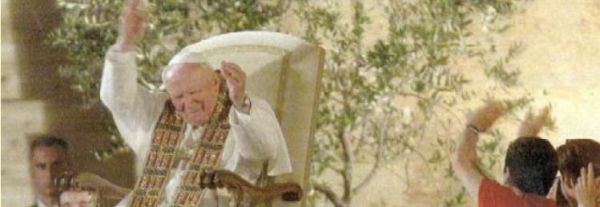1. "But now I go to him who sent me, and not one of you asks me: Where are you going? Indeed, because I have told you these things, sadness has filled your hearts. Now I tell you the truth: it is good for you that I go away, for if I do not go away, the Comforter will not come to you; but when I am gone, I will send him to you" (John 16: 5-7).
Christ's words spoken on the eve of the passion and death on the cross take on their full meaning as the Church prepares for Christ's departure on the 40th day after the resurrection. This day is at hand.
2. And that joy of which Jesus speaks to his disciples on that day, in the Upper Room, before his passion, is close at hand: "your sorrow will be turned into joy" (Jn 16:20). It will be joy at the birth of the Church. The sadness over Christ's departure will be changed into precisely this joy, when the apostles experience - on the day of Pentecost - that the power of the Spirit of Truth is within them, which enables them - above all human regard and all human weakness - to bear witness to the risen Crucified One.
Together with the coming of the Holy Spirit, the time of the Church will begin in the history of mankind, in which the fullness of time, which began on earth with Christ, conceived by the Holy Spirit and born of the Virgin, whose name was Mary, will continue to ripen.
3. It is a great mystery, what is contained in the words at the cenacle: "If I do not go, the Comforter will not come to you, but when I am gone, I will send him to you" (Jn 16:7). These are key-words. These are words that reveal the Trinitarian economy according to which the inscrutable God - Father, Son and Holy Spirit - works in time. It is the economy of the Redemption, that is, of man's salvific return to God through grace: the return "at the price" of God's coming to man in the Incarnation; the return "at the price" of the Incarnate Son's departure through death on the cross; the return of man and the world - which came out of God's hands - to the same fatherly hands, to communion with the Godhead; the return through man's sonship of the Eternal Son, through Grace; the return in the Holy Spirit.
4. "I went out from the Father and came into the world; now I leave the world again, and go to the Father" (Jn 16:28). "I leave the world," though I do not detach myself from the world. I abide in it through the Holy Spirit. I remain in it through the truth of the Gospel. Through the Eucharist and the Church. Through the Word and the Sacraments. Through the grace of Divine sonship. Through faith, hope and charity.
"I leave the world" - but I do not detach myself from the world. I do not detach myself from the man of all times. I lead him to the Father! To the Father's house. Despite all resistance and objections that come from sin in the history of the world, I lead man to the Father.
The Mother of God precedes us on this path. Let us join her in prayer by reciting the "Regina Coeli".
[Pope John Paul II, Regina Coeli 4 May 1986]












